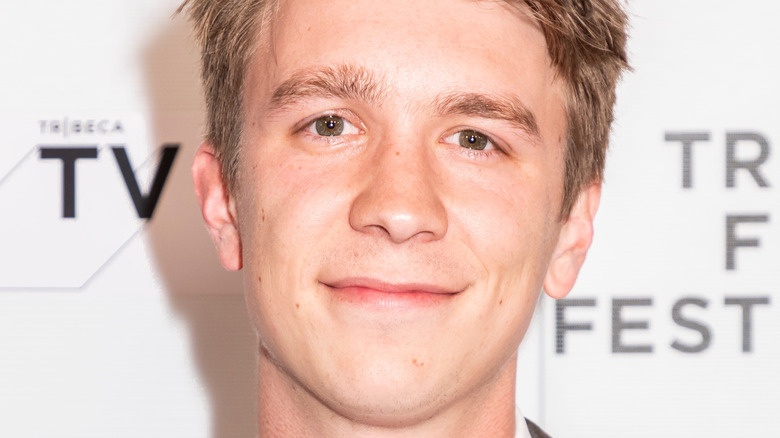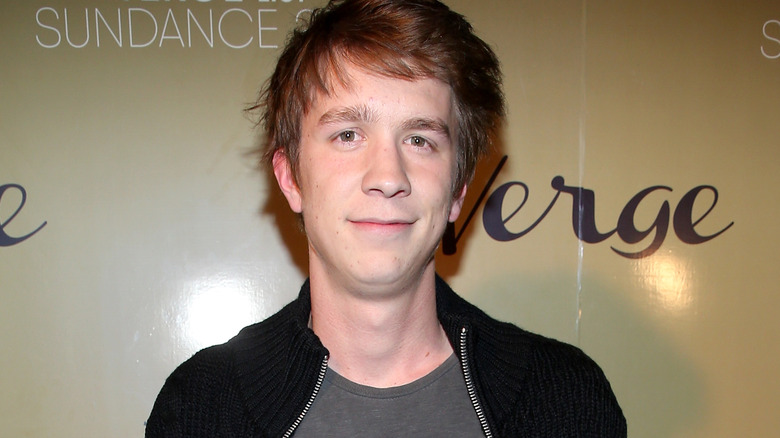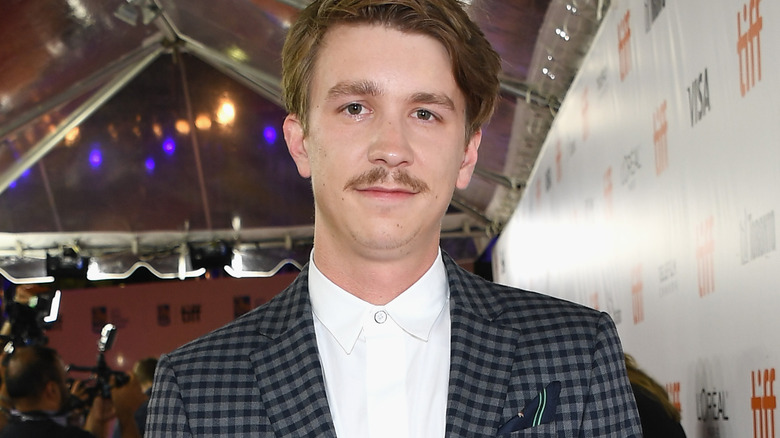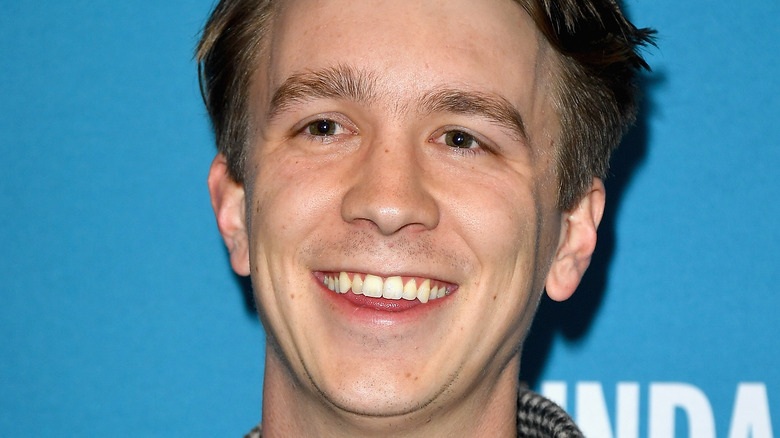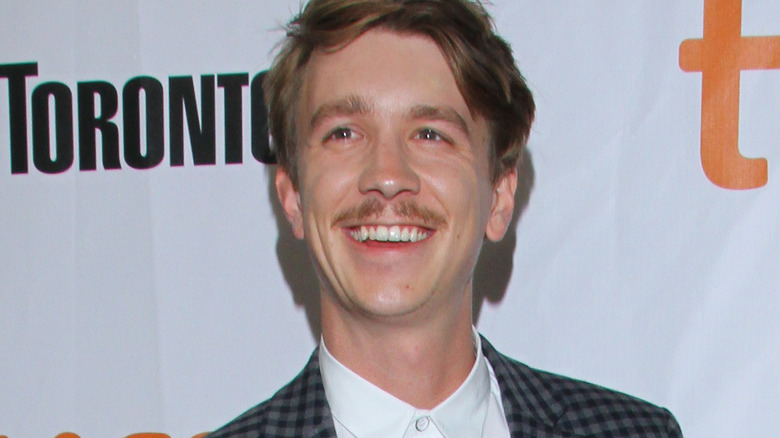Thomas Mann Talks Bringing Psychological Thriller Chariot To Life - Exclusive Interview
More films are being released than ever thanks to streaming services and an increasing number of film artists being given the opportunities to realize their projects. This leads to films that are both — and simultaneously — fun and challenging, like Adam Sigal's "Chariot." The film, which releases across multiple platforms today, sees Thomas Mann in the leading role of Harrison, a man with a strange recurring dream that won't go away.
"Chariot" also stars Rosa Salazar, John Malkovich, and Shane West in prominent roles. Salazar plays Mann's love interest, and she is, in fact, the reason he's become the glitch in the system upheld by Malkovich's Dr. Karn. The film tells the story of a reincarnation program that gives individuals countless life times, and while they store their memories, these people are never supposed to remember them. Thus, when Harrison meet's Salazar's Maria and appears to begin remembering former lives in which they were in love, Dr. Karn must intervene.
A true psychological thriller that keeps viewers guessing in its lost-in-time approach, "Chariot" puts its actors to the test, as their performances carry lifetimes of nuance and lived experience. Luckily for us at The List, we had the opportunity to talk with the "Project X" actor ahead of the film's release. Mann, whose prior credits include "Hansel & Gretel: Witch Hunter," "Me and Early and the Dying Girl," and "Kong: Skull Island," informed us about the many ways "Chariot" challenged him, as well as what inspired his performance in it.
Did Chariot challenge Thomas' philosophies on life?
What can you tell us and tease about "Chariot" for our readers?
The main thing that drew me to "Chariot" was that it reminded me of my favorite David Lynch films. When I read the script, it was so bizarre and so unique and had all these strange characters that I wanted to see it come to life. I feel like we achieved a pretty decent version of what I had in my mind and hopefully what Adam [Sigal] had envisioned when he wrote it. It's a great story about this guy who is having this [recurring] dream. He goes to this sleep doctor and in the meantime he's staying at this ... Oh, now I'm listing off the plot of the movie.
It's not a very straightforward movie. You have to watch it and see it for yourself, but it's a psychological drama about who we were in our past lives and the implications of that on our current lives and future lives as well. That's a very vague summary of it.
The film at its core is really about life and mortality. What is your personal philosophy on life and dreams, and did this film challenge your own philosophy?
In some ways, it did, because you wonder what your dreams really are and what they are manifesting and are they truly a mystery? Are they random, or are they trying to tell you something, and is that you communicating with a past life or a future life or a parallel version of yourself? These are very heady topics, but the movie doesn't bog you down with these ideas or force you to try to answer these questions. It wants to take you on a ride, but there's things that are there to pick apart if you so choose. That's what I love about the movie, is that you can choose your own journey and there's a lot of different avenues to dissect.
On the film being trapped in time
In that same vein, the film seems rather trapped in time, with the set dressing and everything. Especially, I don't think we even see a cell phone, a modern day cell phone, until over an hour into the movie, which is really interesting. I feel like at the beginning, you're almost wondering, "What time period are we in?" How did the set help you bring your character to life?
It was a deliberate decision to set the movie in a timeless place in time. It reminded me of a '90s movie, for some reason. I was like, "This feels like a '90s movie," like "Jacob's Ladder" or the darker David Fincher movies of the '90s. It seemed like such a noir kind of thing. I knew that, oh, [my character's] not going to wear any makeup.
If anything, he's going to have dark circles under his eyes because he hasn't slept. I wanted to feel like the world had a texture and that he was very lived in and that we caught him at a low point in his life, and that he's been struggling. These dreams have driven him to this place where he can't hold relationships and he's depressed and has trouble sleeping because he doesn't want to have the dreams again. Those things manifest in different ways and I think he's a very lost individual.
You mentioned David Lynch and these other inspirations. Did you dive into a lot of these films for research, or did you rely on this script?
I'm trying to remember now. We shot this right when we came out of the ... It was my first thing that I shot coming out of the pandemic, coming out of 2020, because I didn't work all at [that year] and then boom, February, we started shooting "Chariot" in 2021.
Thomas reveals which films inspired his acting choices in Chariot
It was so long ago that I'm trying to remember what movies I watched. I know [director Adam Sigal] used "Jacob's Ladder" as a reference, "Barton Fink," the Coen brothers film, "Eraserhead," which is a David Lynch movie. I watched "Barton Fink" to prepare for it because that also takes place in a hotel or an apartment building type situation. That had a very similar vibe to me, and we're trying to take a lot of the idiosyncrasies of that and bring them to this movie.
I love that. It even feels like it could be part of the "American Horror Story" world in some ways, which I thought was really fascinating.
That's interesting. I didn't think about that, but you're right.
Specifically, the "Hotel" season came to mind. It was really interesting. The film, because you said it's so open and viewers can really find their own path in the movie, because it's so open like that, did you have any confusion when approaching the role? Or was it rather clear to you?
I did, to be honest, but that was part of what I liked about it. If something is all there on the surface and it makes perfect sense to you when you read the script, then there's nowhere to go from there ... You want to live in the gray areas a little bit and I feel like this movie did that really well. Was I lost? I wasn't, I trusted Adam enough that he knew what the through line was because the character himself, Harrison, doesn't know what's happening to him either. If I'm confused and Harrison's confused, then it all feeds back into the movie. I used any confusion about the script that I had and fed it back into the character.
What prior films best helped Thomas prepare for Chariot?
Hey, it works. That's really smart too. In a way, this film's love story almost reminds me of what I've heard about your upcoming film, "About Fate." What can you tell us about how these films might be similar?
Oh gosh, I haven't considered that. They're very different in tone, but the similarities, there's a fate aspect to "Chariot" and how things that are meant to be will find a way. That's definitely a theme in "About Fate," these random forces that are bringing two people together and you don't know why. There's a time and place where, if you keep seeing this person and these things keep bringing you together, you're like, "Well, there's something there that has to be explored." Maybe there are some similarities. I should think about that a little bit more.
Up until this point, I'm interested to know what films from your career might have helped you prepare best for "Chariot."
I did a movie called "Preppie Connection" actually, that was a thriller, not a psychological thriller, about this kid who was smuggling cocaine from Colombia and funneling it back to his New England prep school. You see the tension, he's this lost kid who then becomes this obsessed, frantic person. That was similar to Harrison in this movie. I'm trying to think of other characters that were similar or that had a similar trajectory, but I don't know. What I liked about this character is that he was unique.
Every time I take a part, I try to find a new version of myself to be. I'm not someone who is like, "Oh, I completely became Harrison." It's always a version of me. I'm always trying to be more myself in that way, because when you're doing different characters, it's always going to be an extension of you. I try to treat it as something new every time so I don't feel like I'm rehashing my old tricks.
"Chariot" is now playing in select theaters. The film is also available on demand and for digital rental or purchase.
